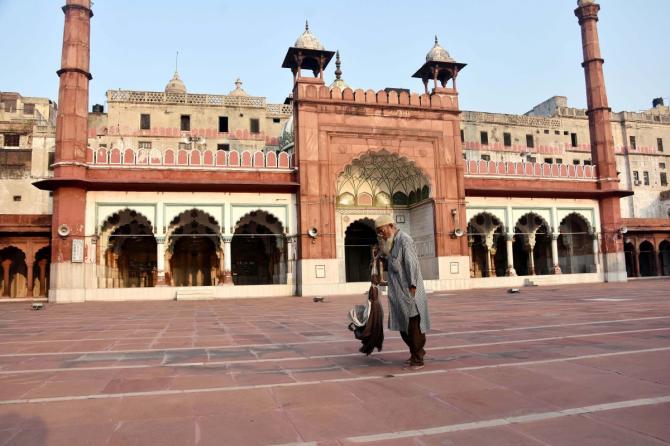'Under this amendment, in any dispute over Waqf properties, the Waqf Board cannot approach the court.'
'This is very surprising because the government instead of protecting Waqf properties they are snatching it away and not allowing them to go to court.'
'The third biggest landowner in India is the Waqf Board after the Indian Army and Indian Railways.'

On Thursday, August 8, 2024, the Centre introduced the Waqf (amendment) Bill in the Lok Sabha, and even though the government's allies like Janata Dal-United and Telugu Desam Party extended support, the vociferous opposition to the bill led the government to agree to send it to a Joint Parliamentary Committee for greater scrutiny.
It is only the 11th bill to be referred to a JPC since 2015.
The last time the Waqf Act saw major changes was in 1995 during the P V Narasimha Rao government's tenure.
While the Narendra D Modi government believes reform is overdue in Waqf matters, the Opposition believes the amendments are draconian, unconstitutional and an interference in religion (Islam, in this case).
Waqf Boards currently control 870,000 properties extending over 940,000 acres all over India, that are valued at Rs 1.2 lakh crores.
So what exactly is the Waqf and how did it come about?
Syed Firdaus Ashraf/Rediff.com spoke to Shahid Siddiqui, former member of the Rajya Sabha and editor Nai Dunia, to find out.
What is Waqf?
In Islam there is a provision that any person can donate his wealth for the betterment and welfare of poor orphans or destitute women by giving it to the Waqf, which is like a trust.
This trust will work for the betterment of the poor orphans and destitute women. And this cannot be a government property because it is donated by a private individual to Waqf.
It is like if I have four homes I give two to my children and two to Waqf because I want the welfare system to continue after my death. This is present across the world in Islamic countries and so does it in India.
The Waqf Board administers Waqf properties across India.
When was the Waqf Board set up?
It will be difficult to give a date but it is assumed that since Islam spread in India, Waqf exists. The British, when they conquered India, made the Waqf law.
What happened to the Waqf law after Independence?
It continued and the last amendment to the Waqf Act was done in 1995. It was decided then that Waqf will be used for the welfare of poor Muslims but the management of Waqf will be done by the government's intervention. The Waqf Board will be appointed by the Government of India or the respective state governments.
Can a non-Muslim be a Waqf Board member?
There was never a ban on a non-Muslim becoming a Waqf Board member. It was just an understanding that only Muslims will run the Waqf Board and an under-secretary in the government will be appointed to run the Waqf Board. Right now, it is under the minority affairs ministry.
What good work has the Waqf Board done so far?
They have done good work in maintaining dargahs, graveyards, madrasas and masjids. There are many orphanages too that are run by the Waqf Board.
So, why are objections being raised to the amendments to the Waqf Act?
It is to oppose the intention of the government. The intention of the new bill is to finish off the Waqf Act and to control the Waqf Board.
What is the worst fear of Muslims over the amendments?
The present dispensation speaks about one nation and one law and here you are making a different law for Muslims.
Anything else?
Yes, under this amendment, in any dispute over Waqf properties, the Waqf Board cannot approach the court. This is a very surprising decision because the government instead of protecting Waqf properties they are snatching it away and not allowing them to go to court.
This is very dangerous because Waqf properties are spread across India. The third biggest landowner in India is the Waqf Board after the Indian Army and Indian Railways.
What were Muslims expecting in the new bill?
The government should have helped to remove the encroachers sitting on Waqf properties and use it for the welfare of Muslims. Instead, they are trying to curtail the rights of the Waqf Board. Therefore, the intention of the government looks like it is not positive and not right.
People who are opposing the Waqf Act in its current form say that if the Waqf Board claims a right on any property in India it becomes theirs and there is no court hearing for that. In such cases what to do?
This is not true. Waqf records are available from the Mughal days. The Waqf Board cannot come and demand you to vacate your home as it is being portrayed. It is a ridiculous argument.
So, any good points in the new amendments?
Yes, they want to digitise all Waqf records. But then they have given only six months to do so.
It will take at least four years to do this work because there is too much of encroachment.
If there is one property where there is maximum encroachment in India, it is in Waqf properties.
What is the Waqf Board's income?
It is low because they have rented out their properties many years ago. In the new bill the rule says the Waqf management will only get 5 percent of that income while earlier it was 7 percent.
Is there any misuse of position or corruption in the Waqf Board?
Yes, there is, no doubt, because whichever government came to power in the states or Centre, they have their own supporters in the Waqf Board. There was no criteria in appointing the board members like they must be ex-judges or ex-teachers by profession.
The only criteria was that they must be close to the ruling party, and even if they are uneducated they got the post.
The Waqf Board even declares ASI-protected monuments as its property. Does it have the right to do so?
It is not like that. In the past there are Waqf properties that have gone to the Archaeological Survey of India, like the Safdarjung Tomb and the Qutb mosque in Delhi which is under the ASI. At the Taj Mahal there is a mosque which was with the Waqf Board but is now with the ASI and Muslims are not allowed to pray there.
Is there any benefit from the amendment?
There is only one benefit as there will be registration. The flip side is if they do not do it in six months there will be trouble.
What about the tribunal powers of the Waqf Board?
They are reducing the tribunal powers of the Waqf Board. This right is given by the Government of India to tribunals but, then, why single out the Waqf tribunal only? There are 70 to 80 such tribunals in India.











 © 2025
© 2025